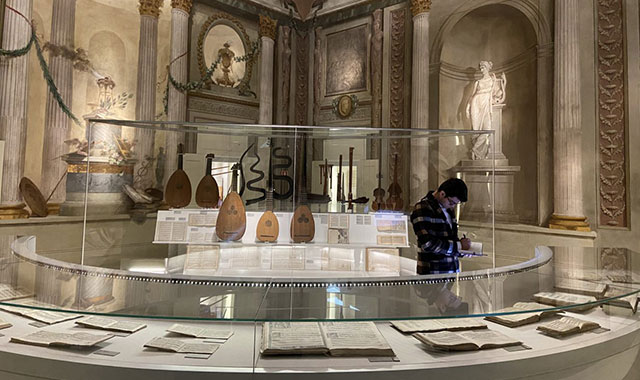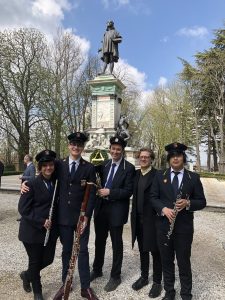 Unlike many study abroad programs, which involve registrations at foreign institutions and administrative hurdles to transfer courses, the COLFA Semester in Urbino offers UTSA courses taught by UTSA faculty or by University of Urbino faculty who have been vetted and approved by UTSA. The courses have been carefully selected to fit into UTSA degree plans and will appear seamlessly in ASAP. Moreover, since you will remain a full-time UTSA student during your semester abroad you will have access to UTSA services such as financial aid and library resources and will not encounter difficulties with minimum credit-hour requirements for financial aid or scholarships.
Unlike many study abroad programs, which involve registrations at foreign institutions and administrative hurdles to transfer courses, the COLFA Semester in Urbino offers UTSA courses taught by UTSA faculty or by University of Urbino faculty who have been vetted and approved by UTSA. The courses have been carefully selected to fit into UTSA degree plans and will appear seamlessly in ASAP. Moreover, since you will remain a full-time UTSA student during your semester abroad you will have access to UTSA services such as financial aid and library resources and will not encounter difficulties with minimum credit-hour requirements for financial aid or scholarships.
Supplemental art and cooking classes are also available during the semester
If you want to get a head start on Italian language so that you can enroll in the advanced class in Urbino, try the Italian Language and Culture class on edX. It is all online and you can audit for free!
Important Dates for Spring 2022
See some of the important events and trips scheduled for the semester. Many of the details are still being finalized, so some dates and trip destinations may vary. A printable schedule of class meeting times will be available before the semester begins. Note that Carnival in Italy takes place from February 19 to March 1. Various optional events will be scheduled. Consult the Spring 2022 Timeline for meetings, payments, and scholarship deadlines.
| August 27 | List of participating students finalized |
|---|---|
| October 1 | $1000 commitment fee due |
| November 1 | $1750 balance of first payment due (remaining payments will be invoiced in ASAP and due on January 15, February 15, and March 15) |
| January 29 | students arrive in Italy (either G. Marconi Airport in Bologna (BLQ) or Leonardo da Vinci International Airport in Fiumicino, Rome (FCO): the location is still TBD) no later than 1:30; charter bus to Urbino arrives at 2:30 and departs no later than 3:00. Anticipated arrival in Urbino at 5:30. |
| January 30 | 9:00 GEV Orientation 1:00 Welcome lunch 3:00 Urbino tour |
| January 31 | Classes begin. We will meet in front of the Collegio Internazionale and walk together to meet the Italian language teachers |
| February 4 | Guided tour of Pesaro (public bus) including Rossini's birth house, Civic Museum, and historic fish market |
| February 6 | 9:30 guided tours of the Ducal Palace in Urbino and historic Urbino |
| February 10 | day trip to Bologna |
| February 11 | Guided tour of the Girolomoni organic pasta factory and the Il Conventino winery and olive production mill |
| February 17-20 | Rome |
| February 24 | day trip to Perugia |
| March 3 | day trip to Assisi |
| March 10-13 | Siena and Florence |
| March 14-20 | Urbino Spring Break |
| March 24 | day trip to Gubbio |
| March 31-April 3 | Verona and Venice |
| April 6 | Ceremony and Concert in observance of the 502nd Anniversary of the Death of Raffaello |
| April 7-9 | Linguistics Colloquium |
| April 14 | day trip to Ravenna |
| April 14-18 | Easter Break (no classes) |
| April 25 | Liberation Day Procession and Concert |
| April 26 | Final Exams, Papers & Projects; Farewell dinner |
| April 27 | Final Exams, Papers, & Projects Studio cleaning & check out |
| April 28 | Early Departure Bus to Rome 5 am (also one at midnight for those with early flights). All studies must depart from Italy on this day |
Course Information
The following 15 credit hours of courses are offered for music majors in the Spring 2022 semester. The focus will be relevant to all of the Bachelor of Music degrees. Graduate versions of these courses are also available. If you are a graduate student in Music interested in the COLFA Semester in Urbino, please contact Dr. Drew Stephen for more information.
| MUS 2403 | Conducting I |
|---|---|
| MUS 3213 | Music in Civilization I |
| MUS 3223 | Music in Civilization II |
| MUS 2542/3532/3543 | Private Instruction |
| FL 1034 | Elementary Italian |
Course Descriptions
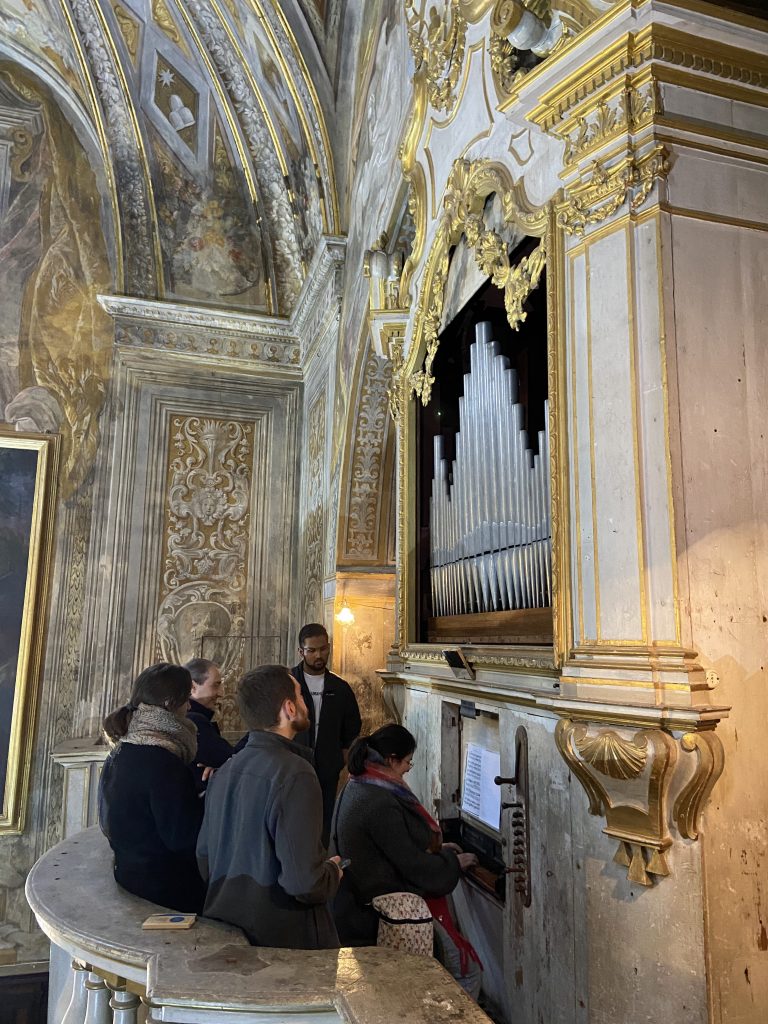 MUS 3213 Music in Civilization I. This course surveys the Western art music tradition from antiquity to 1750. During the semester abroad students will have rich opportunities to study the music of the Medieval, Renaissance, and Baroque eras while visiting many of the locations where the music was created and first heard. We will move beyond the traditional classroom setting with course trips that include: Venice, where students will see the orphanage where Vivaldi worked and experience the Basilica of St. Mark’s where Monteverdi and Gabrieli created their polychoral works; Rome where we will visit the Sistine Chapel where Palestrina provided music for the private worship of the popes; and Bologna where we will visit the Basilica of San Petronio and view the oldest working pipe organ in the world. We will also visit music instrument museums in Florence, Rome, and Bologna to see ancient instruments including Stradivarius string instruments and Cristofori pianofortes and gain firsthand experience of original music manuscripts. The experiential approach will allow students to gain an understanding of how the early eras of music history developed within the broader contexts of Italian culture and music.
MUS 3213 Music in Civilization I. This course surveys the Western art music tradition from antiquity to 1750. During the semester abroad students will have rich opportunities to study the music of the Medieval, Renaissance, and Baroque eras while visiting many of the locations where the music was created and first heard. We will move beyond the traditional classroom setting with course trips that include: Venice, where students will see the orphanage where Vivaldi worked and experience the Basilica of St. Mark’s where Monteverdi and Gabrieli created their polychoral works; Rome where we will visit the Sistine Chapel where Palestrina provided music for the private worship of the popes; and Bologna where we will visit the Basilica of San Petronio and view the oldest working pipe organ in the world. We will also visit music instrument museums in Florence, Rome, and Bologna to see ancient instruments including Stradivarius string instruments and Cristofori pianofortes and gain firsthand experience of original music manuscripts. The experiential approach will allow students to gain an understanding of how the early eras of music history developed within the broader contexts of Italian culture and music.
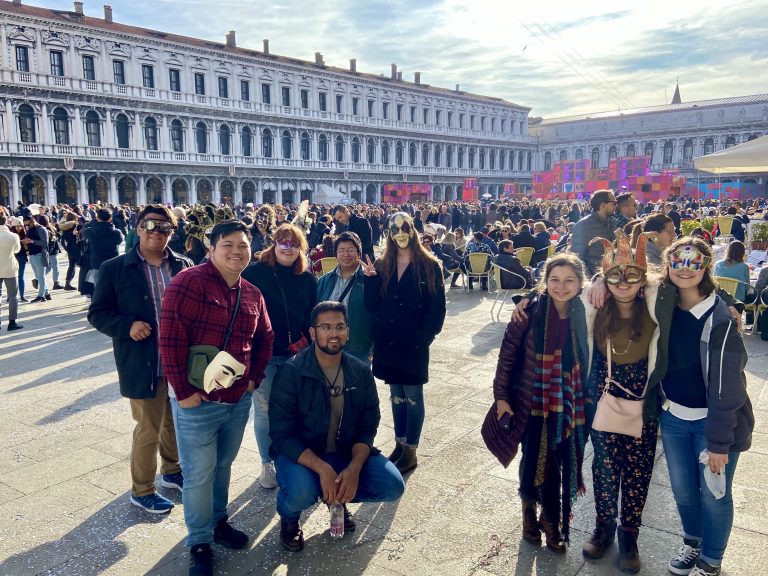 MUS 3223 Music in Civilization II. This course surveys the Western art music tradition from roughly 1730 to the present. During the semester abroad students will have rich opportunities to study the music of the Classic, Romantic, and twentieth-century eras while visiting many of the locations where the music was created and first heard. We will move beyond the traditional classroom setting with course trips that include: Pesaro to visit the birth house of Gioachino Rossini; multiple locations in Rome that are evoked in Ottorino Resphigi’s Pines of Rome, Fountains of Rome, and Roman Festivals; Verona where we will visit the Roman arena that is now the home of the famous opera festival; and Assisi where Messiaen lived for a year notating the sounds of nature for his final opera on the life of Saint Francis. While looking at trends since 1730 we will also learn about significant Italian developments such as the bel canto operas of Rossini, Bellini, and Donizetti, Verdi’s role in the Risorgimento; the verismo operas of Puccini and Mascagni; the stunning sound experiments of the Italian Futurists; and the film music of Nino Rota and Ennio Moricone. The experiential approach will allow students to gain an understanding of how the more recent eras of music history developed within the broader contexts of Italian culture and music.
MUS 3223 Music in Civilization II. This course surveys the Western art music tradition from roughly 1730 to the present. During the semester abroad students will have rich opportunities to study the music of the Classic, Romantic, and twentieth-century eras while visiting many of the locations where the music was created and first heard. We will move beyond the traditional classroom setting with course trips that include: Pesaro to visit the birth house of Gioachino Rossini; multiple locations in Rome that are evoked in Ottorino Resphigi’s Pines of Rome, Fountains of Rome, and Roman Festivals; Verona where we will visit the Roman arena that is now the home of the famous opera festival; and Assisi where Messiaen lived for a year notating the sounds of nature for his final opera on the life of Saint Francis. While looking at trends since 1730 we will also learn about significant Italian developments such as the bel canto operas of Rossini, Bellini, and Donizetti, Verdi’s role in the Risorgimento; the verismo operas of Puccini and Mascagni; the stunning sound experiments of the Italian Futurists; and the film music of Nino Rota and Ennio Moricone. The experiential approach will allow students to gain an understanding of how the more recent eras of music history developed within the broader contexts of Italian culture and music.
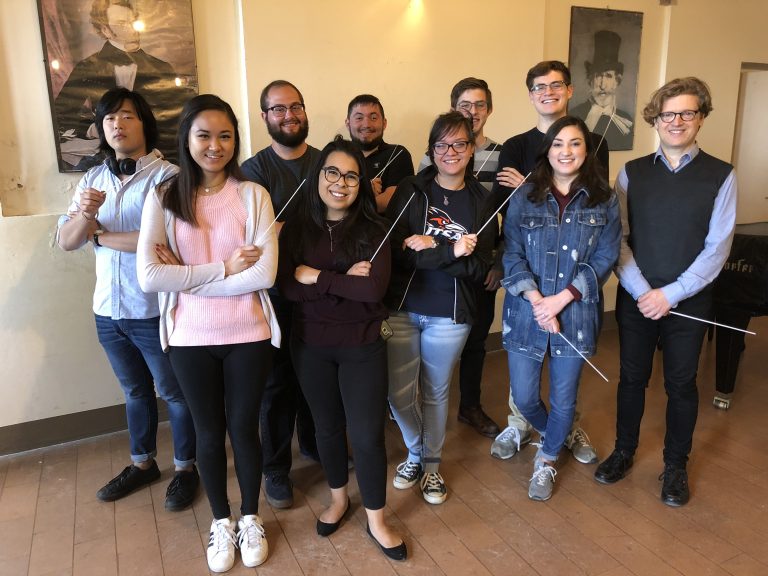 MUS 2403 Conducting I. This is a three-credit course for music majors that establishes and develops basic conducting skills with an emphasis on score study and gestural development. During the semester abroad students will participate in lab activities with Michele Mangani while completing online self-evaluations and observations to develop an awareness of gestural patterns and rehearsal techniques.
MUS 2403 Conducting I. This is a three-credit course for music majors that establishes and develops basic conducting skills with an emphasis on score study and gestural development. During the semester abroad students will participate in lab activities with Michele Mangani while completing online self-evaluations and observations to develop an awareness of gestural patterns and rehearsal techniques.
Special note from Dr. Zarco: For those of you taking conducting in Urbino that need a baton, you have some options. There are quite a few great baton making companies out there and many can work well if they are balanced, but there is a vendor we typically use for the class that I can recommend. If you decide to use these batons, the instructions/website and discount code are below. There is also a helpful tutorial that can assist you in determining what length baton is best to use for your frame. That video is located here: https://www.custombatons.net/baton-length-info-page (This info is helpful regardless of where you purchase your baton.)
To purchase your baton from Custom Batons (Chris Blount, craftsman):
- Go to www.custombatons.net
- Go to “Online Store” at the top – click on either “Fiberglass Batons” or “Graphite Batons” (I recommend fiberglass for your 1st baton. You can go for a graphite baton; they are lighter, but are a little more expensive). You could also opt for a “Custom Baton,” (menu at the top) made in whatever length/wood/handle shape you’d like, but I wouldn’t recommend it unless you know there is a particular handle shape/wood you like. They are also more expensive.
- Browse around and see what is available. Last I checked, some of the stock is limited, but I hope that changes. NOTE: The most important thing, aside from length, is handle shape. You won’t have a chance to try out different shapes; some people’s hands just gravitate towards particular types of handles. A good basic handle shape that works well for just about everyone is the “teardrop.” You can read about handle shapes here: https://www.custombatons.net/handle-shapes
- Once you decide on a baton, add it to your cart (select the one with the length closest to what you measured from the baton length video above).
- Purchase a baton case – the ones produced by Custom Batons are TERRIFIC – they look professional and are virtually indestructible. It’s great for traveling and I even use it when I go to Urbino. Go to “Online Orders” at the top, go down to “Cases” and order the “Zippered Tube Case.” https://www.custombatons.net/cases/zippered-tube-case
- When you are ready to checkout, go to your cart (upper right hand corner) and input the code: SD415 to get 15% off your order
- Payment is made online and the batons will be shipped to you within a week or so.
MUS 2542/3532/3543 Private Instruction. During the semester abroad students will continue to work with their assigned UTSA instructors while also taking private lessons with professional musicians in the Urbino area. There will be regular performance seminars during the semester and students will also have the opportunity to perform with local ensembles and choirs.
FL 1034. Beginning Language Study Abroad. Opportunity to begin developing oral and written communication skills in the Italian language, along with enhanced comprehension skills in listening and reading. Linguistic and cultural immersion.
Spring 2020 Faculty
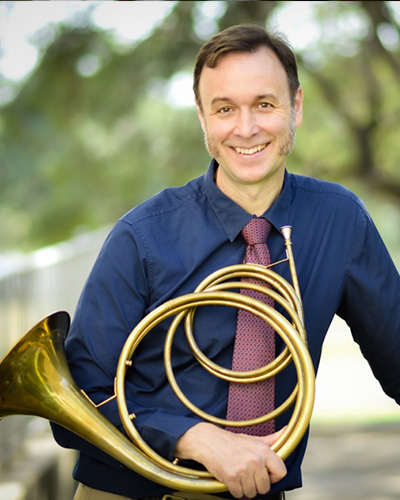 Dr. J. Drew Stephen is an Associate Professor of Musicology in the Department of Music at UTSA and the Co-Director of the COLFA Semester in Urbino. He holds degrees from the University of Western Ontario, the University of Toronto, and a diploma in Horn Performance from the Staatliche Hochschule für Musik in Freiburg, Germany. From 1991 to 1995 he held the position of Alternate Solo Horn in the Orchestra of the Landesbühnen Sachsen in Dresden, Germany. Dr. Stephen’s research concerns the social and cultural significance of the hunt in European music of the nineteenth century with a particular focus on opera. He has presented papers, both nationally and internationally, on the role of the hunt in the works of Weber, Wagner, Verdi, and Brahms, on the hunt as a mediator of national identity, and on the influence of the hunting horn and hunting-horn music on the development of the orchestral horn and its repertoire. His most-recent publication addresses Jewish music and culture at the Urbino court of Federico da Montefeltro. With his extensive experience living in Europe and researching European topics, as well as his fluency in German, French, and Italian, Dr. Stephen brings enormous strengths to the COLFA Semester in Urbino. Dr. Stephen was the recipient of the 2019 Richard S. Howe Outstanding Undergraduate Teaching Award which recognizes teaching excellence and the development of signature learning experiences beyond the traditional classroom environment.
Dr. J. Drew Stephen is an Associate Professor of Musicology in the Department of Music at UTSA and the Co-Director of the COLFA Semester in Urbino. He holds degrees from the University of Western Ontario, the University of Toronto, and a diploma in Horn Performance from the Staatliche Hochschule für Musik in Freiburg, Germany. From 1991 to 1995 he held the position of Alternate Solo Horn in the Orchestra of the Landesbühnen Sachsen in Dresden, Germany. Dr. Stephen’s research concerns the social and cultural significance of the hunt in European music of the nineteenth century with a particular focus on opera. He has presented papers, both nationally and internationally, on the role of the hunt in the works of Weber, Wagner, Verdi, and Brahms, on the hunt as a mediator of national identity, and on the influence of the hunting horn and hunting-horn music on the development of the orchestral horn and its repertoire. His most-recent publication addresses Jewish music and culture at the Urbino court of Federico da Montefeltro. With his extensive experience living in Europe and researching European topics, as well as his fluency in German, French, and Italian, Dr. Stephen brings enormous strengths to the COLFA Semester in Urbino. Dr. Stephen was the recipient of the 2019 Richard S. Howe Outstanding Undergraduate Teaching Award which recognizes teaching excellence and the development of signature learning experiences beyond the traditional classroom environment.
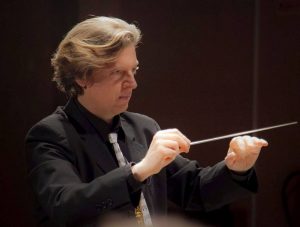 Conductor, composer, and clarinetist Michele Mangani was born in Urbino and studied at the Rossini Conservatory in Pesaro and the G. B. Martini Conservatory in Bologna. His compositions have been performed by soloists and ensembles around the world and he is in high demand as a guest clinician and adjudicator. He is a Professor of Chamber Music for winds at the Rossini Conservatory in Pesaro and Director of the Music Academy at the Capella Musicale SS Sacramento in Urbino. He has directed the Civic Wind Orchestra of the Cappella Musicale in Urbino for over 30 years.
Conductor, composer, and clarinetist Michele Mangani was born in Urbino and studied at the Rossini Conservatory in Pesaro and the G. B. Martini Conservatory in Bologna. His compositions have been performed by soloists and ensembles around the world and he is in high demand as a guest clinician and adjudicator. He is a Professor of Chamber Music for winds at the Rossini Conservatory in Pesaro and Director of the Music Academy at the Capella Musicale SS Sacramento in Urbino. He has directed the Civic Wind Orchestra of the Cappella Musicale in Urbino for over 30 years.
 The Italian language courses are taught by certified instructors at Lingua Ideale Urbino working under the auspices of the University of Urbino “Carlo Bo”. Lingua Ideale is a professional language school offering courses of Italian language and culture to foreigners. The curriculum for the COLFA Semester in Urbino has been designed to meet the requirements of the foreign language courses at UTSA while also incorporating local aspects of Italian culture.
The Italian language courses are taught by certified instructors at Lingua Ideale Urbino working under the auspices of the University of Urbino “Carlo Bo”. Lingua Ideale is a professional language school offering courses of Italian language and culture to foreigners. The curriculum for the COLFA Semester in Urbino has been designed to meet the requirements of the foreign language courses at UTSA while also incorporating local aspects of Italian culture.
Read the sample syllabi for the Italian Language courses

